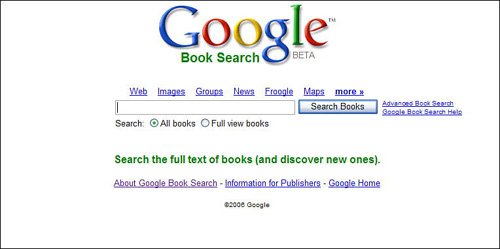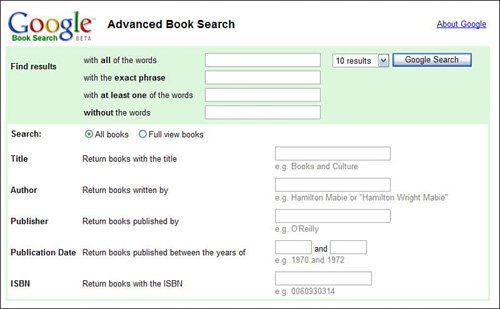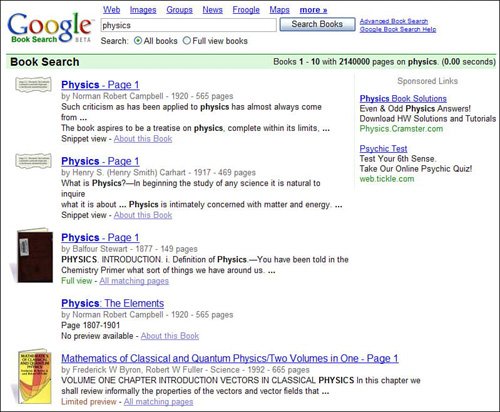|
As the Google Books Library Project goes about its business of scanning in hundreds of thousands of library books, it's important to note that Google is scanning those books without first seeking the approval of those books' authors or publishers. That has caused a great deal of friction between Google and the publishing communityand at least one major lawsuit.
The so-called "publishing community" is separate from the library community, and it's the libraries that Google is working most closely with. Publishers and libraries have significantly different mindsets, which is at the core of this conflict.
You see, publishers (and authors), whatever their artistic intent, are ultimately in the business to make money, which they do by selling books. Libraries, on the other hand, exist to disseminate information, most often for free. It's this age-old conflict between generating revenues and distributing information that Google has deliberately walked right into the middle of.
When it comes to allowing their books to be available via Google Book Search, publishers are of decidedly mixed minds. Some publishers view it as a promotional opportunity and another potential outlet for book sales; other publishers view it as interfering with their own internal sales plans. That's why you see some publishers cooperating with Google on this project, but many more publishers shying away. These less-enthusiastic publishers want to protect their copyrights and restrict access to the books they publish; they're more likely to partner with an online bookseller like Amazon.com than with a site that, in their view, gives content away for free.
Authors face a similar dilemma. Should they embrace Google Book Search as a way for readers to find out about their less-visible works, or should they be afraid of Google lessening the value of their content by giving it (or some of it) away for free?
Opposing Google's effort is the Authors Guild. The Guild, along with individual authors Herbert Mitgang, Betty Miles, and Daniel Hoffman, have sued Google over the Book Search program, alleging that Google is engaging in massive copyright infringement at the expense of the rights of individual writers.
Authors Guild president Nick Taylor had this to say about the situation:
"This is a plain and brazen violation of copyright law. It's not up to Google or anyone other than the authors, the rightful owners of these copyrights, to decide whether and how their works will be copied."
The problem, as many authors see it, is that Google is scanning all library books by default, and then requiring disinterested authors and publishers to opt out of the program. A better approach would be to ask permission before scanning, instead of assuming that permission and then allowing proactive opt-outs. As currently constructed, the program can inadvertently include content that authors (or publishers) do not want distributed online.
That said, many authors think that Google Book Search can increase the visibility of the books they've written. For example, here's what author Paul Andrews says about the program:
"As a longtime dues-paying member of the Authors Guild, I'm party to a lawsuit against Google over its new book-search service called Google Book Search. As an author of two books, though, I'm not sure I want to be suing Google. Every writer wants his or her work to be read. But to be read, a work needs to be found. Digital search is fast becoming the de facto way to be found, [and] Google Book Search aims to do for books what Google has done for the Web."
Author Cory Doctorow puts it more distinctly:
"Thank you, thank you, thank you Google, for providing a way to put books back into the daily round of average people."
As an author, I can see both sides of the conflict. On one hand, I really don't want Google or any other entity giving away copies of my books (electronic or otherwise) for free, without paying me any royalties. On the other hand, if only snippets of my books are available for online browsing, what's the harm? In fact, if viewing a page or so online encourages a potential reader to actually purchase a printed copy of one of my books, I benefit from the exercise.
The spanner in the works, however, is whether readers of nonfiction works can find the information they want from a Google search result snippet, and therefore not have to purchase the printed book. It's possible, for example, that someone searching for information about Google Book Search might be able to read this very page online, and therefore not have to purchase the entire book. In this instance, Google Book Search becomes a deterrent to book sales, which isn't a good thing. (At least it's not a good thing for authors and publishers; for readers, it might be a different story.)
My gut tells me that as long as Google Book Search only shows short snippets of book content, it actually works to promote the sale of printed books, especially those books that don't receive a lot of promotion or appear on the best-seller lists. If the program evolves to providing the full text of works online, without the approval of or compensation to the legal copyright holder, then the program is more akin to intellectual property theft than it is to providing useful information for web searchers. As pundits are fond of saying, only time will tell the ultimate impact of the Google Books program.
| 

